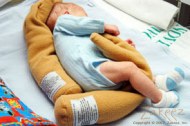Children Don't Die First...Do They?
In the natural order of things, children grow into adulthood, marry and have children of their own. Children aren't supposed to die before their parents. Yet sometimes, children do die leaving parents behind to grieve.
Arnold and Gemma in their book, A Child Dies A Portrait of Family Grief, described why parents feel so distraught, depression and despair following the death of a child:
 Children are not supposed to die...Parents expect to see their children grow and mature. Ultimately, parents expect to die and leave their children behind...This is the natural course of life events, the life cycle continuing as it should.
Children are not supposed to die...Parents expect to see their children grow and mature. Ultimately, parents expect to die and leave their children behind...This is the natural course of life events, the life cycle continuing as it should.The loss of a child is the loss of innocence, the death of the most vulnerable and dependent.
The death of a child signifies the loss of the future, of hopes and dreams, of new strength, and of perfection.
I think for many it is the death of the dreams, the death of hopes and the death of their future that is the most difficult for parents to fact following the loss of a child, at any age.
Quote Source:
Arnold JH, Gemma PB. A Child Dies A Portrait of Family Grief. Philadelphia, PA: The Charles Press Publishers. Second Ed. 1994.
These thoughts are also featured on the Squidoo lens, My NICU Baby has Died.
Photo Source: Phil Landowski. Dust to Dust. Royalty Free Use.















